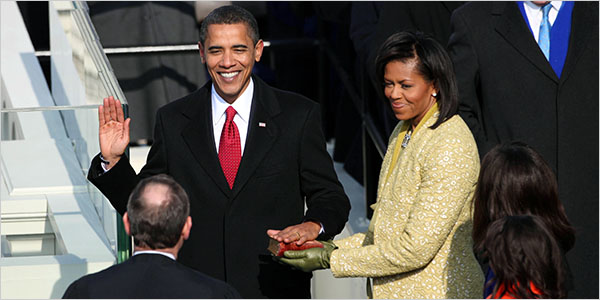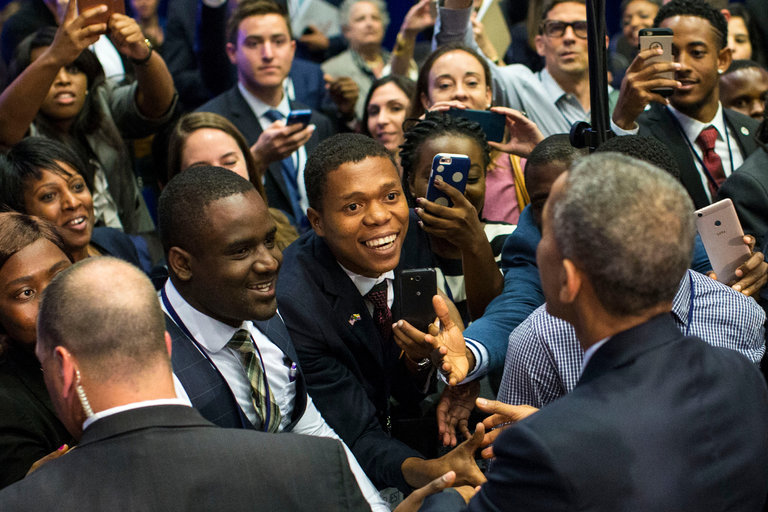Obama Faces Growing Expectations on Race and Policing
Audience members greeted President Obama after he spoke at the White House Summit on Global
Development on Wednesday. Credit Al Drago/The New York Times
The New York Times
By JULIE HIRSCHFELD DAVIS
JULY 21, 2016
WASHINGTON — At the White House last week,
DeRay Mckesson, a Black Lives Matter activist who was arrested only days before in Baton Rouge, La., for protesting police violence against African-Americans, had a lengthy list of demands for President Obama.
The president should visit Baton Rouge and other cities where black men have been killed by police officers, appoint special prosecutors to investigate the deaths and use his executive power to force changes in police departments across the country, Mr. Mckesson said.
The next day, a distraught Erica Garner, whose father,
Eric Garner, was killed in 2014 by a New York City police officer who placed him in a chokehold, accosted Mr. Obama after a televised town-hall-style meeting with demands of her own. Why have no police officers been convicted or sent to jail for killing black men, and what was he doing to rid police departments of the tactical military equipment that made community protest routes resemble war zones, she asked.
As Mr. Obama responds to the latest in fatal confrontations between police officers and black men — this time followed by lethal attacks in
Dallas and
Baton Rouge on law enforcement officers by black gunmen — he has also confronted a growing list of expectations that young black activists have placed on him.
In private meetings and impromptu conversations with Mr. Obama, Black Lives Matter activists and others who share their goals have questioned why a president they see as uniquely aware of racism is not doing more to help them.
It’s complicated, Mr. Obama tries to explain — a response he acknowledges is accurate and unsatisfying.
“I feel like the black community is not being listened to, including by the president,” Ms. Garner said in an interview. “We can’t expect him to do everything, but he is the leader, and he can point us in the right direction to ensure that we can get justice.”
Mr. Obama gave his condolences to Ms. Garner but said he was not in a position to offer more because it would be seen, he said, as placing his thumb on the scales during an open Justice Department investigation into what happened to her father. As for the military-style equipment used by police forces, the president said, his administration had addressed the issue, a response that Ms. Garner later called “a brushoff.”
The confrontations highlighted Mr. Obama’s struggle to respond to the Black Lives Matter movement, a diffuse group unlike established civil rights organizations that have deep relationships at the White House and on Capitol Hill.
Mr. Obama first invited Black Lives Matter activists to the White House in 2014 after
unrest in Ferguson, Mo., following the killing of an unarmed black man, Michael Brown, by a white police officer. White House officials said at the time that the activists had grievances but few constructive suggestions. Mr. Obama has prodded them to focus on solutions.
“The goal of protest isn’t just to protest for the sake of protesting,” he said at last week’s town-hall-style meeting. “The goal of protest is to then get the attention of decision-makers and sit down and say, ‘Here’s what we would like to see,’ and have a negotiation, which over time can actually lead to improvements in the system.”
The president, his advisers say, identifies with the protesters’ cause — a former community organizer, he spoke at last week’s meeting about his experiences of being discriminated against by police officers and others — but as the person who appoints the nation’s top law enforcement official, he is equally sensitive to police concerns.
“His empathy isn’t only with the movement, it’s also with the enormous challenge that law enforcement officers have,” said Valerie Jarrett, Mr. Obama’s senior adviser. “He can feel both perspectives because he is of both perspectives.”
In his meeting with Mr. Mckesson at the White House last week — a four-hour session that included activists and law enforcement and elected officials — Mr. Obama said, according to accounts from several in attendance, that it would not be appropriate for him to visit Ferguson or other cities where police killings of black men have occurred. Visits with the families in those places, he said, could be seen as siding with them in open investigations.
The president thanked Mr. Mckesson pointedly for what he called a long “to-do list,” and he added that his willingness to take hours out of his packed schedule should indicate his seriousness about addressing problems of race and policing.
A night later at the town-hall-style meeting, Mr. Obama offered up a defense of Black Lives Matter against critics who have said the movement is inherently racist.
“The phrase ‘black lives matter’ simply refers to the notion that there’s a specific vulnerability for African-Americans that needs to be addressed,” he said. “It’s not meant to suggest that other lives don’t matter; it’s to suggest that other folks aren’t experiencing this particular vulnerability.”
Although Mr. Mckesson and other activists praise Mr. Obama for inviting them to the White House, they say he has not lived up to his promises from that first meeting in 2014.
“He’s actually backtracking in terms of what we asked him to do: to talk about the epidemic of policing and minority communities, to really identify the problem, to acknowledge the disparities and to come behind us as a black president especially,” said Ashley Yates, an organizer in Oakland, Calif., who attended the 2014 session.
Ms. Yates said she was particularly stung by
an open letter Mr. Obama wrote to law enforcement officials this week in which he named and praised in personal terms one of the officers killed in Dallas — something she said he had not done for the black men killed by police officers.
“We do know this is risky business for him and there are political repercussions, but we’re also asking more of our black president — and we’re not seeing it,” Ms. Yates said.
Ms. Jarrett said the criticism ignored important progress that had been made in the two years since Mr. Obama created a policing task force that presented recommendations in 2015 on building trust between law enforcement officials and communities. Twelve states have adopted policies informed by the report.
The administration has also expanded federal grants for body cameras, putting 21,000 on the street. The White House has started data initiatives to better target law enforcement resources and increase transparency about how the police do their work. And Mr. Obama issued an executive order last year to limit the kinds of military equipment federal agencies can provide to local law enforcement agencies.
Brittany Packnett, a member of the policing commission who has done both policy work and community organizing, said she had encouraged fellow activists to aim high in what they are asking of the president, even as her own expectations of what he can do are tempered by experience.
“We should absolutely ask for everything that we need from this president,” said Ms. Packnett, who has met with Mr. Obama several times, including last week. “And also know that we’re not going to get it all now, and we’re not going to get it all from him.”
SOURCE: http://www.nytimes.com/2016/07/22/us/politics/obama-police-race.html?_r=1
.











